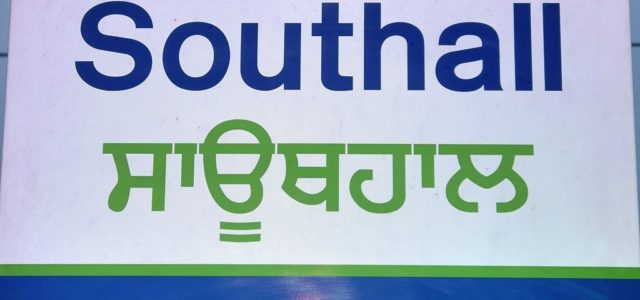Gurminder K Bhambra
23 April 2019 marks the fortieth anniversary of the protests in Southall against the racist and fascist violence that was prevalent in the UK in the 1970s. This special issue looks back at these events both in their own terms and in terms of what can be learned from them in addressing similar issues today.
Southall – a small town in west London, close to Heathrow airport – has been the home of mobile populations primarily from Ireland and the darker Commonwealth and also, latterly, from Somalia, Poland, and Afghanistan, among other places. The postwar period saw sustained political campaigns against those regarded as ‘newcomers’. There were resident campaigns to ‘to stop coloured people buying houses in the area’, a British National Party campaign to ‘Send them Back’ and local borough policies for the dispersal of local South-Asian and Afro-Caribbean children to schools outside of the area through ‘bussing’ (see Bauman 1996). There were also friendships and solidarities across and beyond all such lines.
One of the early responses to racism within the context of employment was the establishment of the Indian Workers Association, which lobbied specifically for union recognition of darker workers as well as being involved in wider political issues related to changes in immigration laws and countering discrimination in housing and education. In 1965, for example, there was a seven-week strike at Woolf’s Rubber factory in Southall led by members of the IWA.
The 1970s saw the rise of neo-fascism with an accompanying rise in racist violence. In 1976, a young schoolboy Gurdip Singh Chaggar was stabbed to death by a group of white youths. This prompted a spontaneous demonstration outside the local police station and calls for action to be taken regarding, what was seen to be, the systematic indifference of the police to racist attacks. The local youth responded by forming the Southall Youth Movement and organising protests, sit-ins, and demonstrations. Women were also actively involved in the political movements of the time, perhaps most notably in the setting up of the campaigning organisation, Southall Black Sisters which continues through to today.
In 1979, on St George’s Day, the National Front organised a meeting at the Town Hall located at the crossroads at the heart of Southall. Several thousand local residents turned out in opposition. The police, protecting the freedom of association of approximately 60 neo-fascists, mostly not from the local area, sought to disperse the protestors. In the process, they caused the death of one protestor, Blair Peach, and seriously injured a number of others including Clarence Baker from People’s Unite who was to remain in a coma for five months subsequently.
Two years later, skinheads returned to Southall, this time for a musical gig held at the Hamborough Tavern. The local community turned out again to protect their town. They used whatever was to hand to defend themselves from the racist violence perpetrated by the skinheads as they sought to smash windows along the high street and terrorise the local population. Through the sheer strength of numbers and collective action, the local youth overwhelmed the fascists who had to be rescued by the police and led away.
The roar of collective anger and solidarity against decades of discrimination and racism was such that, at least in Southall, the National Front and like organisations never again showed their face. There was solidarity also with similar protests, for example, in Brick Lane against the murder of Altab Ali, and with those fighting against street fascism and state violence across the country. As authoritarianism, in its various guises, raises its head again, there is a need for continued vigilance and action.
References
Bauman, Gerd 1996. Contesting Culture: Discourses of Identity in Multi-Ethnic London. Cambridge University Press
Gurminder K Bhambra is Professor of Postcolonial and Decolonial Studies at the University of Sussex.
There is a free symposium, ‘Southall, April 1979: How to fight the fascists and win (then and now)’, discussing these themes to be held at Birkbeck, University of London on Sunday April 28. Details and tickets can be found here.
There are also a number of events organised by Southall Resists. Southall Resists 40 is an initiative of local individuals and organisations, many of whom were involved during the 1976, 1979 and 1981 events. It also includes young activists and artists who want to commemorate the important struggles that defeated fascism locally.
